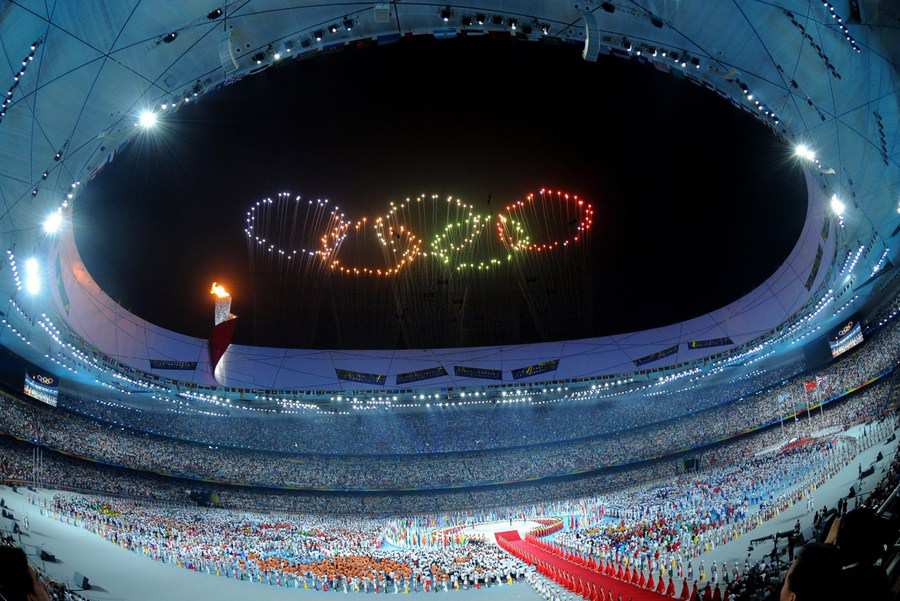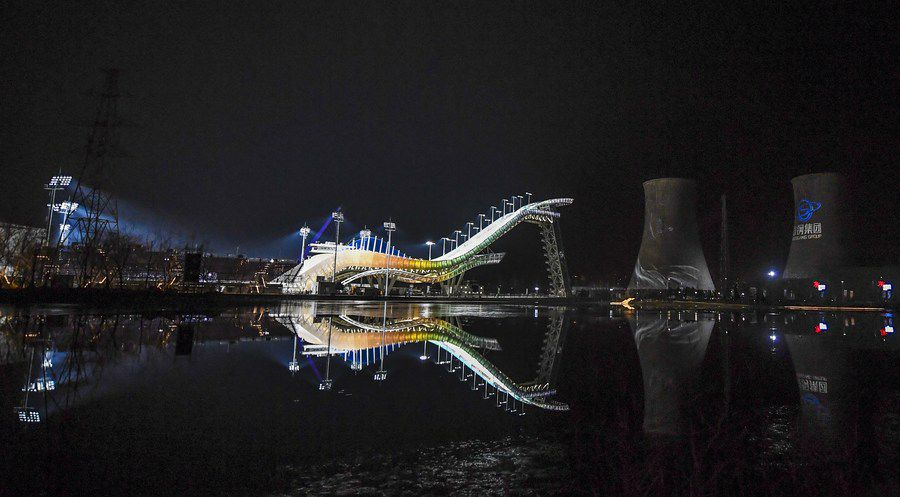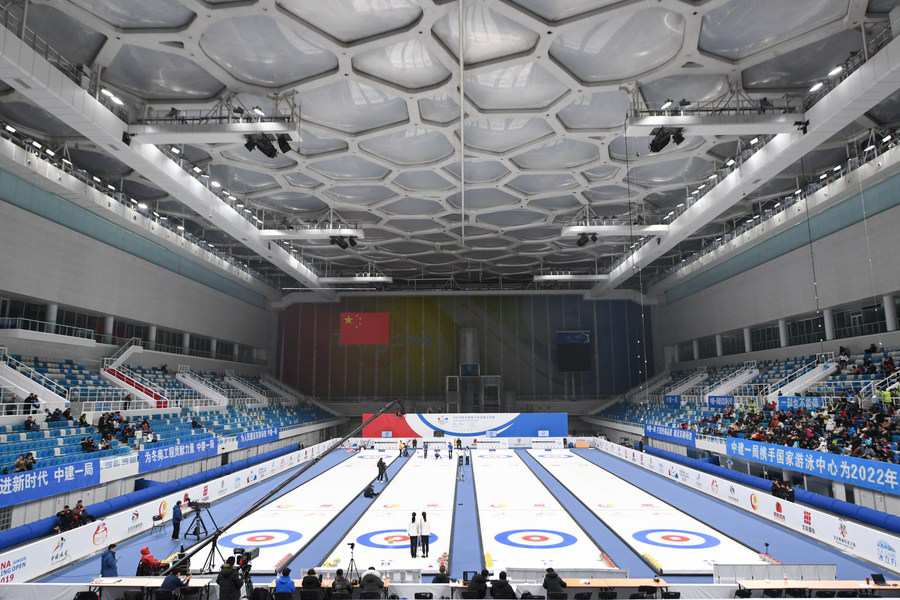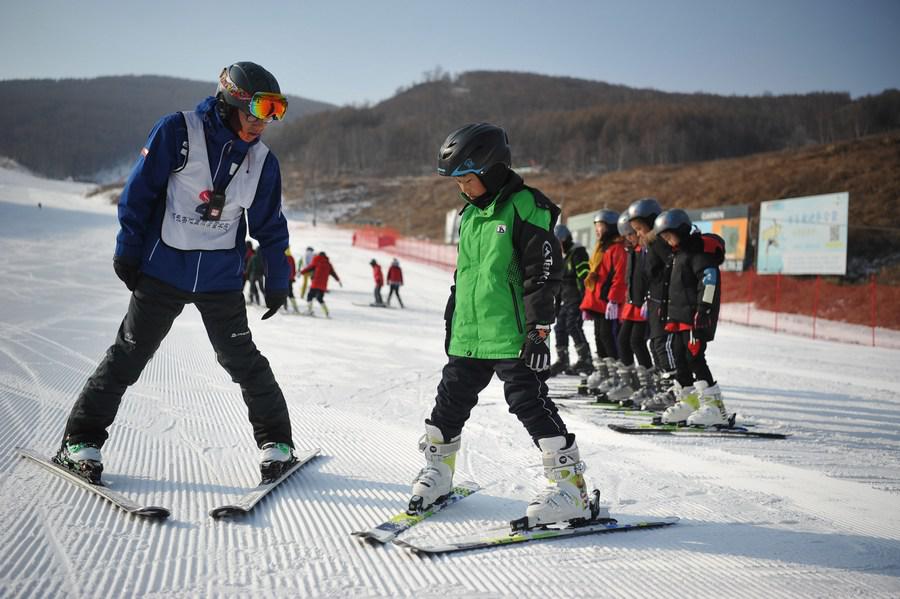

Five years have passed since Beijing's successful bid to host the 2022 Winter Olympiad, and already, the upcoming Games are leaving a legacy, both for the host country and for the wider Olympic movement.
Some Olympic Games come and go as quickly as they arrived, while some stick around in the memories of sports fans for generations. Los Angeles 1984, London 2012 and, of course, Beijing 2008 are all the Olympic Games that immediately spring to mind when anyone mentions the Olympic legacy.

Photo taken on Aug. 8, 2008 shows fireworks in the shape of the Olympic rings during the opening ceremony of the Beijing Olympic Games held in the National Stadium, also known as the Bird's Nest, in Beijing. (Xinhua/Ma Zhancheng)
The 2008 Beijing Summer Olympics was perhaps the most iconic games of the modern era. This edition of the Games was like nothing the world had seen before or since. With stunning venues and stadia, memorable moments, as well as a whole generation of Chinese children inspired to take up sports, Beijing 2008 remains a significant part of recent Olympic legacy.
But with the 2022 Games under two years away, organizers are not content with just replicating the success of the 2008 Games; they want to leave a lasting legacy.
From creating a whole generation of winter sports enthusiasts to building an environmentally sustainable Games, the organizers gave themselves a real challenge, one that they are meeting head on as the Games approach.
In the face of significant challenges and obstacles, such as the global COVID-19 pandemic, China has pushed ahead with the Olympic preparations.

Thomas Bach (R), president of the International Olympic Committee (IOC), interacts with a child during his visit to the Secret Garden, a venue for the Beijing 2022 Olympic Winter Games, in Zhangjiakou City, north China's Hebei Province, Jan. 29, 2019. (Xinhua/Zhang Chenlin)
Sustainability
Hosting an Olympic Games comes with costs attached. But the cost of hosting an Olympic Games is more than just monetary. Environmental costs have become an equally important part of hosting an Olympics in the modern age.
For Beijing 2022, a crucial part of the Games has been the recycling and reuse of Beijing 2008 venues.
The iconic 'water cube' swimming venue from 2008 has now become the 'ice cube,' a premier curling venue.
In Shougang, a crucial part of the Beijing competition zone for the Games, world-class facilities have been built from the disused steel that used to exist on the site. From one of the biggest steel factories in the world to a mecca for winter sports. From the two high-tech rinks that will host ice hockey and ice skating, to the world's first-ever permanent big-air jump that hosted its first-ever top-level event back in December.

Photo taken on Dec. 14, 2019 shows the Shougang ski jumping platform in Beijing. (Xinhua/Xia Yifang)
Even the ice that the athletes will compete on has been considered. The games will be the first to harness the waste gas carbon dioxide to create the ice surfaces.
In addition, during the venue construction in the Yanqing competition zone, protecting species diversity on the 2,000 meter-high mountain was a top priority. All trees within the zone were registered and had their profiles marked with a QR code. Temporary migration paths were also built for local animals.
"Beijing 2022 puts sustainability high on its agenda and regards it as an indispensable element of staging a 'green, inclusive, open and clean' Games and implementing reforms introduced in the Olympic Agenda 2020," said Zhang Jiandong, Executive Vice President of Beijing 2022.

Birds are seen at the Beijing Wild Duck Lake Wetland in the suburban Yanqing District of Beijing April 5, 2020. (Xinhua/Chen Zhonghao)
Inspiration
An essential part of the successful Beijing 2022 bid was the promise to get 300 million people into winter sports.
This past winter saw considerable growth in people in China taking up skiing and snowboarding for the first time. 23.45 million people went on the slopes during the 2018-19 season, a massive 21.5 percent increase on the season before.
Even as COVID-19 curtailed this year's ski season, the numbers at one resort in the northeast of the country had doubled from the year before. It has become clear that the Chinese passion for snowsports is growing and growing.
IOC Coordination Commission Chair Juan Antonio Samaranch lavished praise on the Beijing 2022 preparations.
"China has faced an incredibly difficult period over the past few months - our thoughts are with all those impacted," he said.

Photo taken on Dec. 8, 2019 shows an audience watching the 2019 China Junior Curling Open girls' final match at the National Aquatics Center (the Water Cube) in Beijing. (Xinhua/Ju Huanzong)
"Despite these unique circumstances, Beijing 2022 has continued to meet key milestones, a true testament to their determination to provide the perfect stage for the world's top winter athletes in just under two years.
"Not only have we seen important progress with their venues, their efforts to engage millions of people in winter sports is heartening. This aligns very much with the spirit of Olympism, and the thoughts of IOC President Thomas Bach in relation to 'sport and physical activity make a great contribution to health' in society," Samaranch said.

A participant competes during the 2019 world ski mountaineering masters Mt. Gangshika in Menyuan County, northwest China's Qinghai Province, May 24, 2019. (Xinhua/Wu Gang)
Legacy
Even now, just under two years away from the 2022 Olympics, the legacy of the games is there for all to see.
China's ecology-first approach to the games has set a high bar for any future Olympics. In the 21st Century, it is now not enough for a country to just host a spectacular event, the Olympic Games now have to be sustainable and not have any lasting negative environmental impacts.
Beijing 2022 has proved that an Olympics can be sustainable and have an ecological conscience.
In addition, the Games have been used as a powerful tool for poverty alleviation outside the city of Beijing in Chongli.
Chongli, one of the two mountainous zones for the Games, had been an area that had yet to be lifted by China's economic development.

Students practise skiing at a ski resort in Chongli of Zhangjiakou City, north China's Hebei Province, Dec. 10, 2018. (Xinhua/Geng Jun)
In 2015, 16.8 percent of the 100,000 residents in this town were classed as living below China's national poverty line. However, in May last year, Chongli was officially lifted out of poverty. Nearly 30,000 of its 126,000 population are employed by ski resorts or related companies and organizations.
Beijing 2022 proved that building a 'green' Olympics and raising people out of poverty were not mutually exclusive outcomes.
For ordinary Chinese, the Games have been a significant focal point for the future. When applications for Olympic volunteers were released in December 2019, an astonishing 810,000 volunteers applied to help.
Already, five years on from the winning bid and under two years from the Games, Beijing 2022 is shaping up to be one of the most iconic Olympics, just like its 2008 Summer counterpart.
From the dramatic settings, to the stories of environmentally sound practices to a whole generation inspired, Beijing 2022 is undoubtedly a Games that will live long in the memory. For a multi-sport event that has been traditionally dominated by European and North American nations, Beijing 2022 could become the turning point that eventually comes to equalize the worldwide winter sports landscape.

 Award-winning photos show poverty reduction achievements in NE China's Jilin province
Award-winning photos show poverty reduction achievements in NE China's Jilin province People dance to greet advent of New Year in Ameiqituo Town, Guizhou
People dance to greet advent of New Year in Ameiqituo Town, Guizhou Fire brigade in Shanghai holds group wedding
Fire brigade in Shanghai holds group wedding Tourists enjoy ice sculptures in Datan Town, north China
Tourists enjoy ice sculptures in Datan Town, north China Sunset scenery of Dayan Pagoda in Xi'an
Sunset scenery of Dayan Pagoda in Xi'an Tourists have fun at scenic spot in Nanlong Town, NW China
Tourists have fun at scenic spot in Nanlong Town, NW China Harbin attracts tourists by making best use of ice in winter
Harbin attracts tourists by making best use of ice in winter In pics: FIS Alpine Ski Women's World Cup Slalom
In pics: FIS Alpine Ski Women's World Cup Slalom Black-necked cranes rest at reservoir in Lhunzhub County, Lhasa
Black-necked cranes rest at reservoir in Lhunzhub County, Lhasa China's FAST telescope will be available to foreign scientists in April
China's FAST telescope will be available to foreign scientists in April